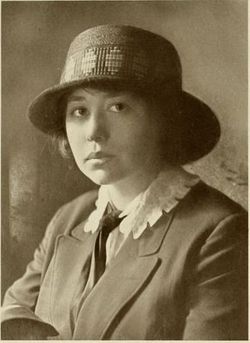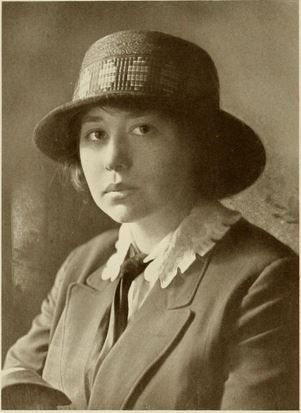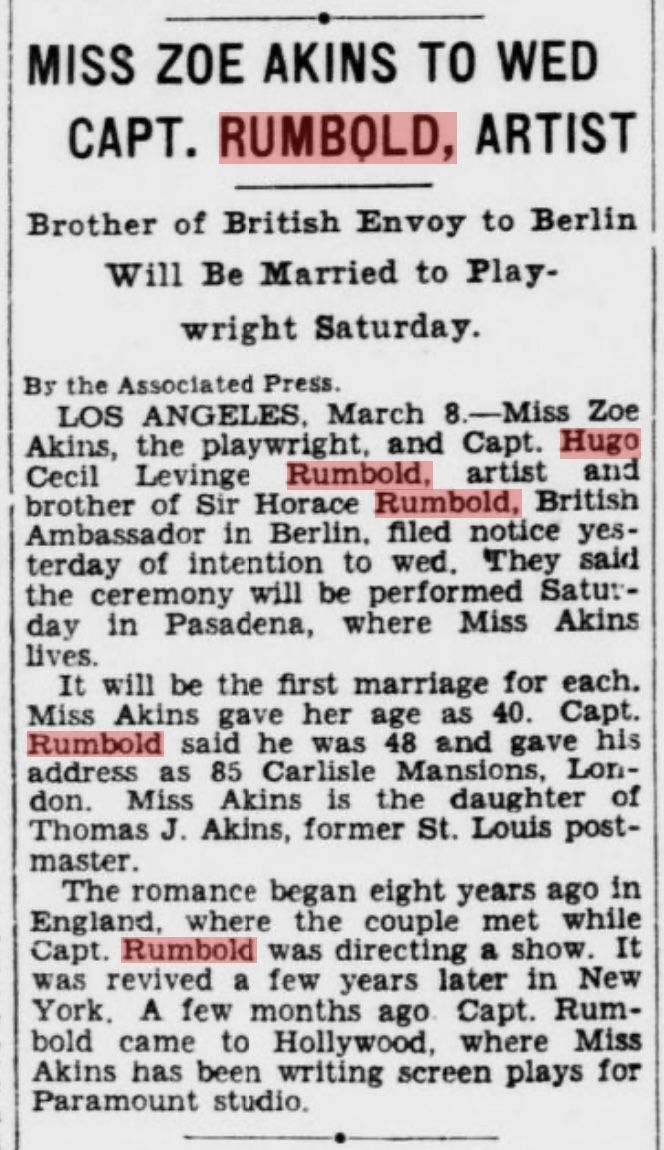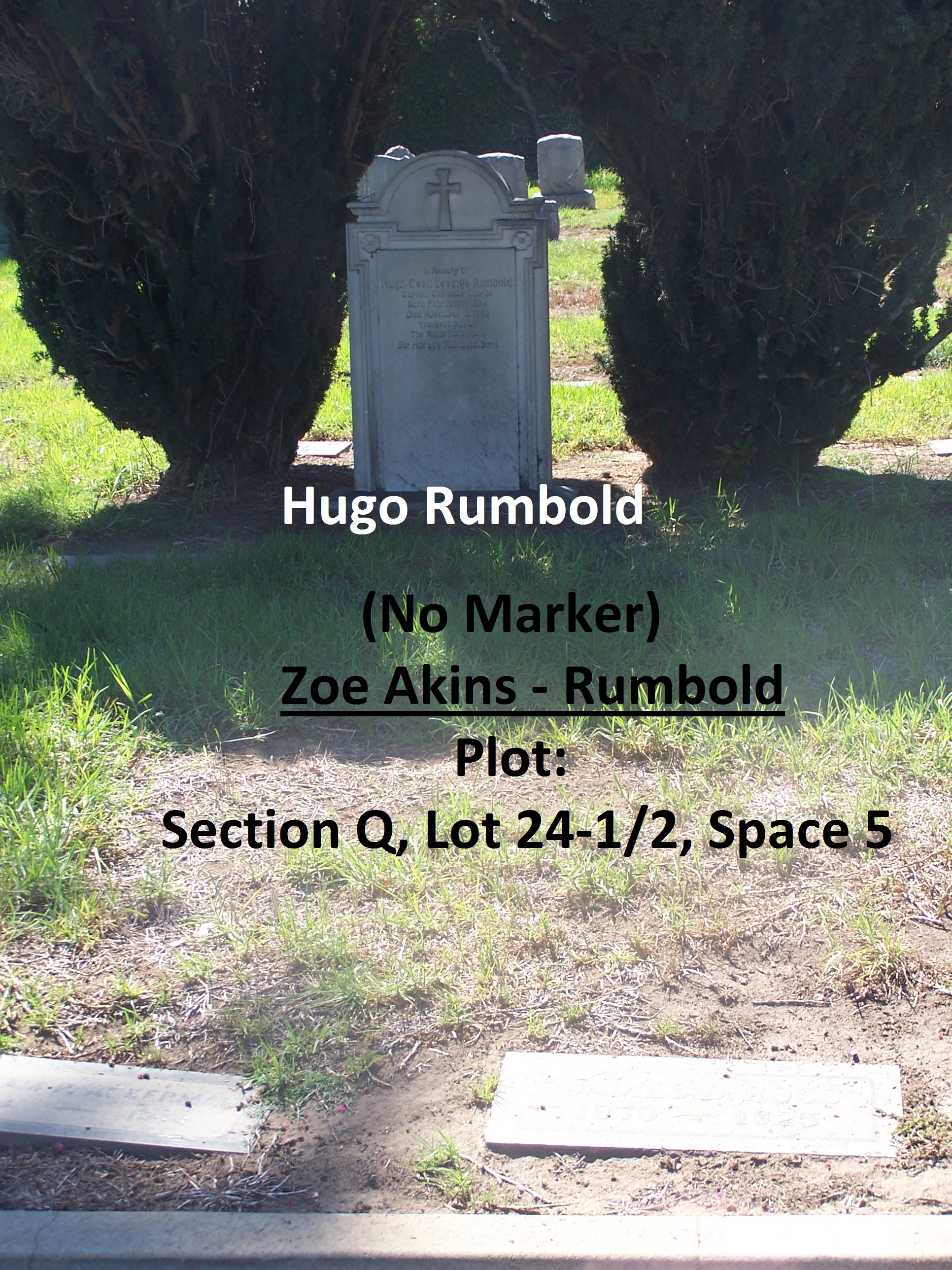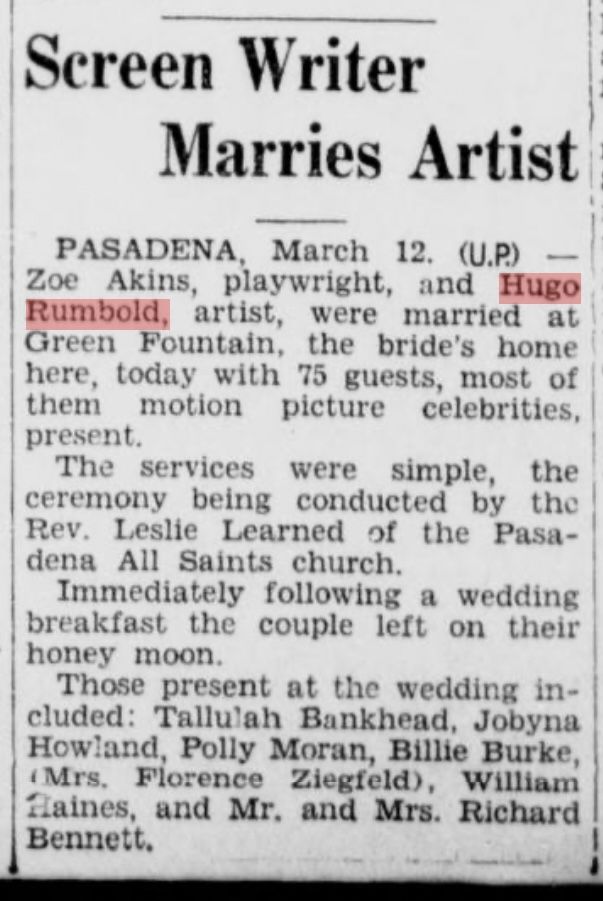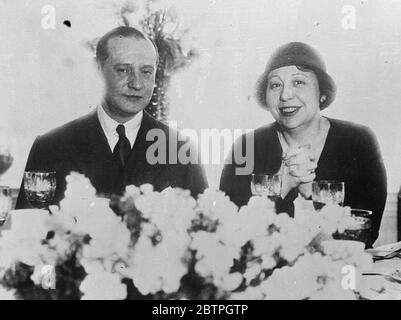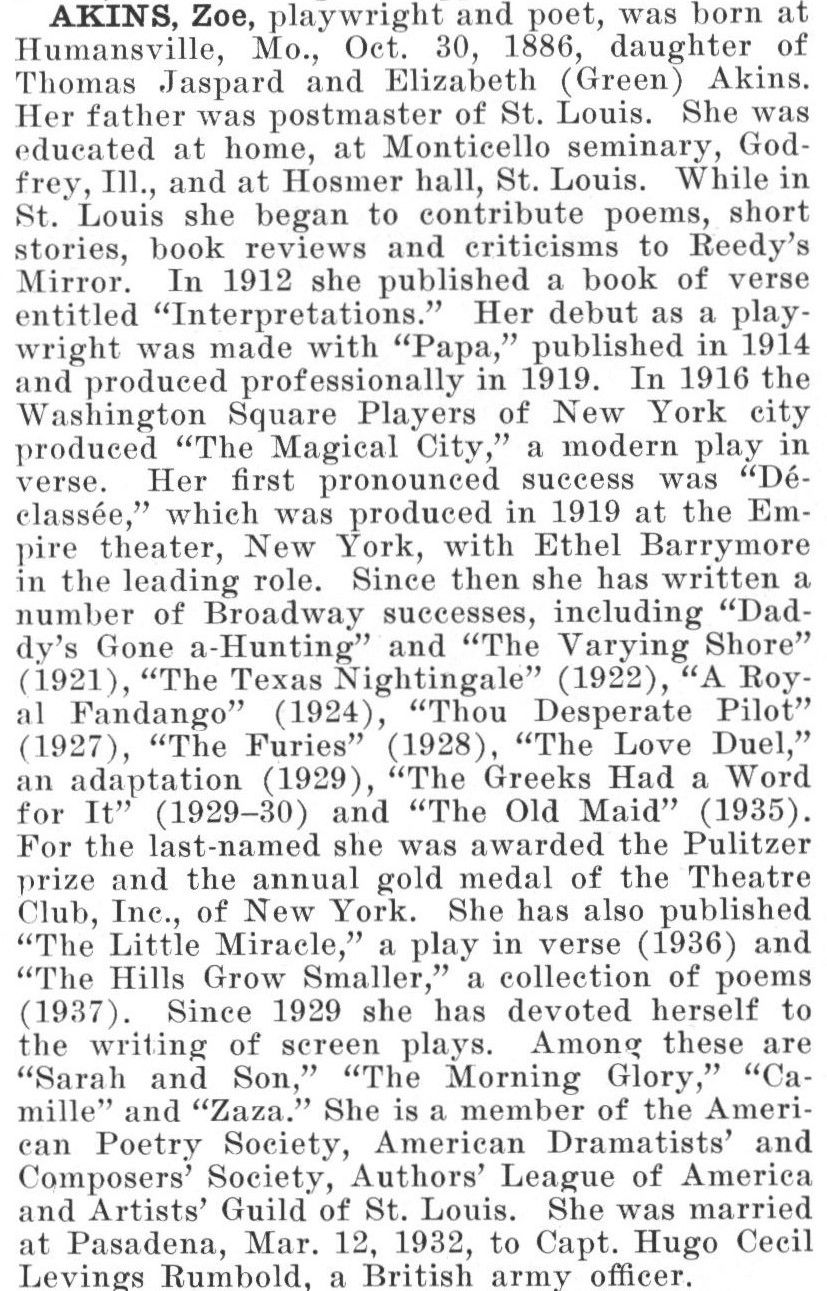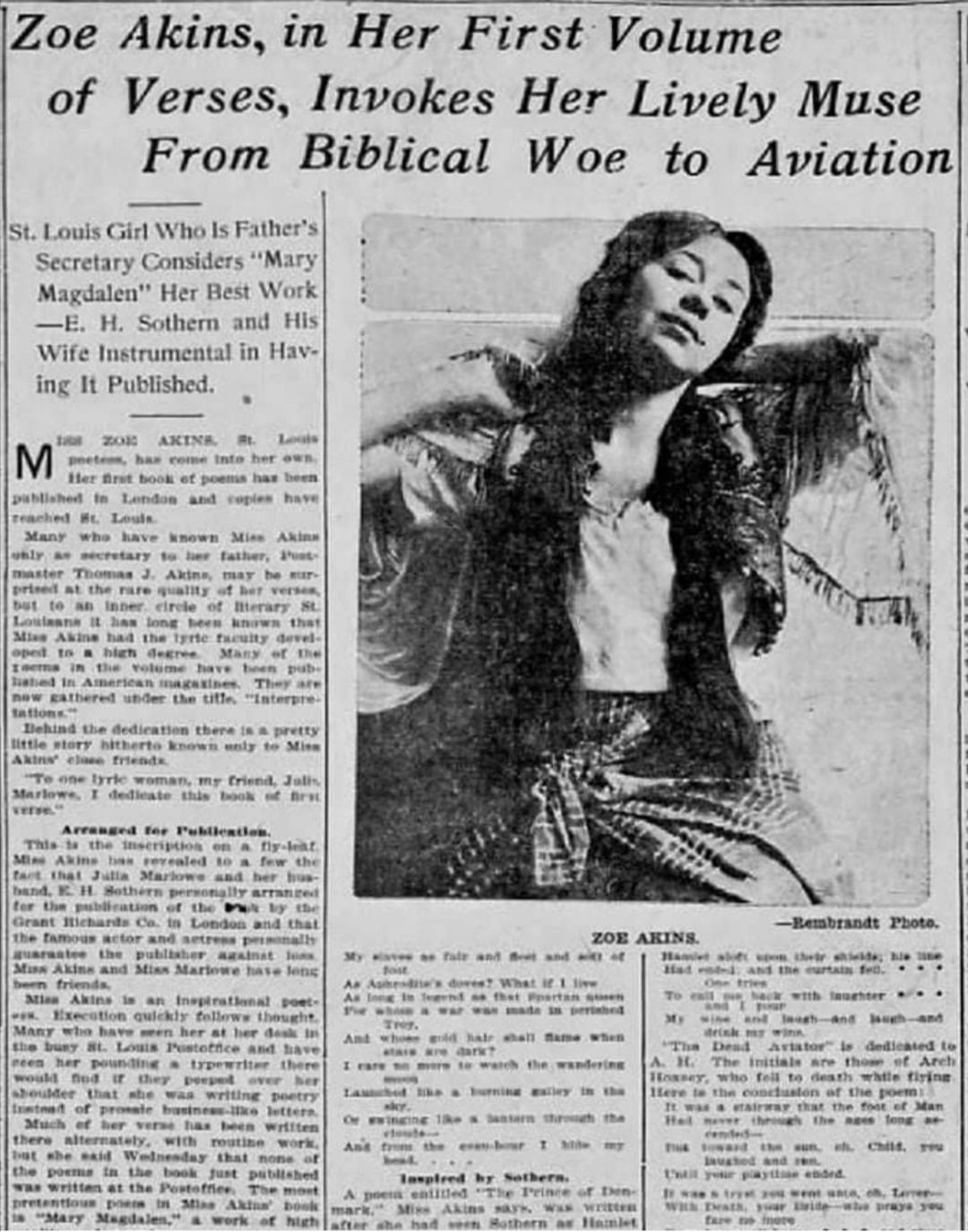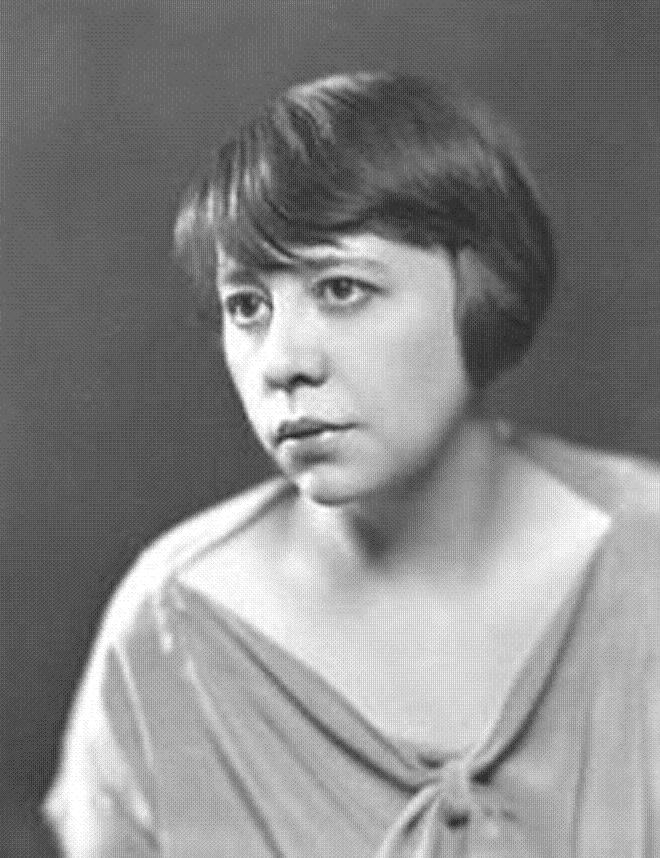second of three children of Thomas Jasper and Sarah Elizabeth Green Akins
Through her mother Zoë Akins was related to prominent figures like 1075;6781& 11816 George Washington and Duff Green
a member of a literary group active in St. Louis in the 1890s and early 1900s, which included such noted people as Minna/Minni Bertrand neé Doering Bernays, Sara Teasdale , and William Marion Reedy.
Zoë Akins (41737078)
MISS ZOE AKINS writes beautiful poems. Her first volume of verse, "Interpretations," published in 1912, was accorded unstinted admiration in the USA and abroad. In this book such poems as 'Mary Magdalen' and the 'Sisterhood' are strongly representative of a new age of thought, while the other poems are also charmingly written.
Miss Akins began writing verse and plays at a very early age. 'The End of the Strike' was written when she was about seventeen. At nineteen she wrote a verse drama, 'Iseult, the Fair,' which, as she states, "for a time promised to be published and produced." Later she wrote a number of other poems that helped lay the foundation of what she has so successfully been building onto ever since. Several other dramatic works also came from her pen about that time, none of which has been published or put on the stage as yet— 'The Voice' 1907, a one-act play, with the scene laid in a Turkish harem; 'The Wandering Shepherd' 1907, a masque; 'The Sin' 1909, a modern drama, in four acts, dealing with heredity mainly; 'The Meddler' 1909, on anarcWsm; 'The Learned Lady' 1910, a comedy, and 'Clemence' 1911, a psychological study, in one act. 'Papa' an amorality in three acts, edited by Edwin Bjorkman, is her latest play, which has caused quite a stir generally and not alone in literary circles.
The light and disdainfully airy manner in which she handles a delicate situation, or, rather, many of them, usually regarded as anything but frivolous, makes the play decidedly unusual in plot and treatment. It is a frothy conception with an underlying interest that lingers with the reader and can not be dismissed so easily nor forgotten so quickly. It is a daring story of an adventure, after which the characters all fall in amicably with whatever is suggested; in real life the solution might not be worked out so happily, and generally is not.
Zoe Akins was born at Humansville, Mo., in 1886, a village in the region of the Ozark Mountains. Her parents moved to St. Louis while she was quite young. For two years she attended Hosmer Hall in this city, followed by two more at Monticello Seminary, Godfrey, III. Miss Akins had some experience on the stage when she was seventeen years old, with the Odeon Stock Company, then playing in St. Louis. Finding nothing attractive in the work, she decided she would never care to become an actress. Then she began writing articles for "The Mirror" and the daily newspapers. One of her ambitions was to meet and know celebrated people.
She is an enthusiastic admirer of Julia Marlowe, who influenced her to study the great European dramatists, and who has been of assistance to her in many ways. Miss Akins' mother was Elizabeth Green, daughter of Dr. Henry Louis Green, who came to St.Louis from Kentucky after the war. Different members of the family of Mrs. Akins were writers and authors, and her uncle, General Duff Green, was a Southern newspaper editor. On her maternal side, also. Miss Akins is a descendant of the Earl of Pembroke. Her father, Mr. Thomas J. Akins, was Postmaster of St. Louis under President Taft, following a position as head of the sub-treasury under President Roosevelt, and is one of the leaders in the Republican party. While Mr. Akins was Postmaster, Miss Zoe acted as his secretary. She spends part of every Winter in New York, where she finds the life and association of literary people much to her fancy.
Miss Akins is small in stature, lovable in disposition and fascinating in manner.
Source: Johnson, Anne (1914). Notable women of St. Louis, 1914. St. Louis, Woodward. This article incorporates text from this source, which is in the public domain.
Contributor: Elisa Rolle (48982101)
Zoë Byrd Akins (1886-1958) was born in Humansville, Missouri, on 30 October, 1886, the second of three children of Thomas Jasper and Sarah Elizabeth (Green) Akins. Her father was for many years the chair of the Missouri Republican Party, and was a descendant of James Akin, a Scots-Irish colonist from Drumbo, Co. Down, Ireland, who settled in Henrico Co., Virginia, in 1657. Through her mother, Akins claimed kinship to a number of prominent Americans, including George Washington and Duff Green.
When her family moved to St. Louis just before the turn of the century, Akins was sent to be educated first at Monticello Seminary in Godfrey, Illinois, and later to Hosmer Hall, a preparatory school in St. Louis. While a student at Monticello Seminary, Akins wrote her first play, a parody of a Greek tragedy. While attending Hosmer Hall, she attended Saturday matinees every weekend. By the time she graduated from Hosmer Hall in 1903, she knew that she wanted a career in the theater, and she considered both acting and writing. In 1905 she acted walk-ons for several weeks with the Odeon Stock Company in St. Louis. Although for a few years she continued to act, she knew that her main talent lay in writing lines rather than in performing them.
By 1910 Akins had turned her attention to dramatic writing, the work for which she became best known professionally. Her early plays include Iseult, the Fair (which Akins dated from 1905), The Learned Lady: A Comedy in Three Acts (copyrighted 1910), Such a Charming Young Man (first produced in 1915), and A Portrait of Tiero (an adaptation of a 1915 story). Her first published play, Papa: An Amorality in Three Acts (1913), was chosen for the important Modern Drama Series published by Mitchell Kennerley and edited by Edwin Bjorkman. It was subsequently produced in Los Angeles in 1916, and then on Broadway with limited success two years later. Akins's first New York City production was her verse play The Magical City, produced by the Washington Square Players in 1915.
Akins continued to live and work in Jennings, near St. Louis, and to visit New York City during the winter theater seasons. In 1919 she moved to Manhattan following the publication of her first novel, Cake upon the Waters, and the success of her first Broadway hit, Déclassée, a melodrama cast auspiciously with Ethel Barrymore in the starring role of Lady Helen Haden.
In the sixteen years following her first big success, Akins had sixteen plays on Broadway, including Footloose, an adaptation of a melodrama (1920); Daddy's Gone A-Hunting and The Varying Shore, original dramas (1921); The Texas Nightingale, an original comedy (1922); A Royal Fandango, an original comedy (1923); The Moonflower, a drama adaptation (1924); First Love, an adaptation (1926); Thou Desperate Pilot, an original drama, and The Crown Prince, an adaptation (1927); The Furies, an original drama (1928); and The Love Duel and Careers, both adaptations (1929).
Akins's interest in varieties of dramatic writing led her to lucrative associations with Hollywood film companies. By the mid-1920s film companies were buying screen rights to her plays, including Déclassée and Daddy's Gone A-Hunting. For The Moonflower, filmed as Eve's Secret in 1925, Akins was paid eight thousand dollars, then a substantial sum. And in 1930 Samuel Goldwyn paid her ten times that amount for The Greeks Had a Word for It. In 1929 Akins moved to California and became a valuable screenwriter as sound transformed the art of motion pictures. Between 1930 and 1938, Akins wrote or collaborated on thirteen screenplays, with another eight films credited to her stories or other material. Akins received screenplay credit for Anybody's Woman, The Right to Love, and Sarah and Son (1930); Once a Lady, Working Girls, and Women Love Once (1931); Christopher Strong (1933); Outcast Lady (1934); Camille and Lady of Secrets (1936); The Toy Wife and Zaza (1938); and Desire Me (1947). Movies based on her work include Morning Glory (1932), notable for Katharine Hepburn's Oscar-winning performance, Girls about Town (1931), and The Greeks Had a Word for Them (1932). Greta Garbo, Ruth Chatterton, Kay Francis, Billie Burke, Herbert Marshall, Melvyn Douglas, Douglas Fairbanks Jr., Joel McCrea, and Frederic March starred in her films. And Akins worked with such able and innovative directors as Dorothy Arzner and George Cukor.
Zoë Akins was a professional writer for more than fifty years. She lived at Green Fountains, her Pasadena home, and remained unmarried until her mid-forties, when in 1932 she married Hugo Rumbold, a British theatrical designer, artist, and lieutenant in the Grenadier Guards who died eight months later. Throughout her career, Akins wrote in all the major literary genres: drama, poetry, fiction, and nonfiction prose. A promising young writer in St. Louis, later productive in both New York City and Hollywood, she epitomizes the new professional woman writer of the first half of the twentieth century.
Akins died in her sleep on the eve of her 72nd birthday, on October 29, 1958, in Los Angeles. She is buried in San Gabriel District Cemetery. She was a member of the AF01 branch of our clan.
second of three children of Thomas Jasper and Sarah Elizabeth Green Akins
Through her mother Zoë Akins was related to prominent figures like 1075;6781& 11816 George Washington and Duff Green
a member of a literary group active in St. Louis in the 1890s and early 1900s, which included such noted people as Minna/Minni Bertrand neé Doering Bernays, Sara Teasdale , and William Marion Reedy.
Zoë Akins (41737078)
MISS ZOE AKINS writes beautiful poems. Her first volume of verse, "Interpretations," published in 1912, was accorded unstinted admiration in the USA and abroad. In this book such poems as 'Mary Magdalen' and the 'Sisterhood' are strongly representative of a new age of thought, while the other poems are also charmingly written.
Miss Akins began writing verse and plays at a very early age. 'The End of the Strike' was written when she was about seventeen. At nineteen she wrote a verse drama, 'Iseult, the Fair,' which, as she states, "for a time promised to be published and produced." Later she wrote a number of other poems that helped lay the foundation of what she has so successfully been building onto ever since. Several other dramatic works also came from her pen about that time, none of which has been published or put on the stage as yet— 'The Voice' 1907, a one-act play, with the scene laid in a Turkish harem; 'The Wandering Shepherd' 1907, a masque; 'The Sin' 1909, a modern drama, in four acts, dealing with heredity mainly; 'The Meddler' 1909, on anarcWsm; 'The Learned Lady' 1910, a comedy, and 'Clemence' 1911, a psychological study, in one act. 'Papa' an amorality in three acts, edited by Edwin Bjorkman, is her latest play, which has caused quite a stir generally and not alone in literary circles.
The light and disdainfully airy manner in which she handles a delicate situation, or, rather, many of them, usually regarded as anything but frivolous, makes the play decidedly unusual in plot and treatment. It is a frothy conception with an underlying interest that lingers with the reader and can not be dismissed so easily nor forgotten so quickly. It is a daring story of an adventure, after which the characters all fall in amicably with whatever is suggested; in real life the solution might not be worked out so happily, and generally is not.
Zoe Akins was born at Humansville, Mo., in 1886, a village in the region of the Ozark Mountains. Her parents moved to St. Louis while she was quite young. For two years she attended Hosmer Hall in this city, followed by two more at Monticello Seminary, Godfrey, III. Miss Akins had some experience on the stage when she was seventeen years old, with the Odeon Stock Company, then playing in St. Louis. Finding nothing attractive in the work, she decided she would never care to become an actress. Then she began writing articles for "The Mirror" and the daily newspapers. One of her ambitions was to meet and know celebrated people.
She is an enthusiastic admirer of Julia Marlowe, who influenced her to study the great European dramatists, and who has been of assistance to her in many ways. Miss Akins' mother was Elizabeth Green, daughter of Dr. Henry Louis Green, who came to St.Louis from Kentucky after the war. Different members of the family of Mrs. Akins were writers and authors, and her uncle, General Duff Green, was a Southern newspaper editor. On her maternal side, also. Miss Akins is a descendant of the Earl of Pembroke. Her father, Mr. Thomas J. Akins, was Postmaster of St. Louis under President Taft, following a position as head of the sub-treasury under President Roosevelt, and is one of the leaders in the Republican party. While Mr. Akins was Postmaster, Miss Zoe acted as his secretary. She spends part of every Winter in New York, where she finds the life and association of literary people much to her fancy.
Miss Akins is small in stature, lovable in disposition and fascinating in manner.
Source: Johnson, Anne (1914). Notable women of St. Louis, 1914. St. Louis, Woodward. This article incorporates text from this source, which is in the public domain.
Contributor: Elisa Rolle (48982101)
Zoë Byrd Akins (1886-1958) was born in Humansville, Missouri, on 30 October, 1886, the second of three children of Thomas Jasper and Sarah Elizabeth (Green) Akins. Her father was for many years the chair of the Missouri Republican Party, and was a descendant of James Akin, a Scots-Irish colonist from Drumbo, Co. Down, Ireland, who settled in Henrico Co., Virginia, in 1657. Through her mother, Akins claimed kinship to a number of prominent Americans, including George Washington and Duff Green.
When her family moved to St. Louis just before the turn of the century, Akins was sent to be educated first at Monticello Seminary in Godfrey, Illinois, and later to Hosmer Hall, a preparatory school in St. Louis. While a student at Monticello Seminary, Akins wrote her first play, a parody of a Greek tragedy. While attending Hosmer Hall, she attended Saturday matinees every weekend. By the time she graduated from Hosmer Hall in 1903, she knew that she wanted a career in the theater, and she considered both acting and writing. In 1905 she acted walk-ons for several weeks with the Odeon Stock Company in St. Louis. Although for a few years she continued to act, she knew that her main talent lay in writing lines rather than in performing them.
By 1910 Akins had turned her attention to dramatic writing, the work for which she became best known professionally. Her early plays include Iseult, the Fair (which Akins dated from 1905), The Learned Lady: A Comedy in Three Acts (copyrighted 1910), Such a Charming Young Man (first produced in 1915), and A Portrait of Tiero (an adaptation of a 1915 story). Her first published play, Papa: An Amorality in Three Acts (1913), was chosen for the important Modern Drama Series published by Mitchell Kennerley and edited by Edwin Bjorkman. It was subsequently produced in Los Angeles in 1916, and then on Broadway with limited success two years later. Akins's first New York City production was her verse play The Magical City, produced by the Washington Square Players in 1915.
Akins continued to live and work in Jennings, near St. Louis, and to visit New York City during the winter theater seasons. In 1919 she moved to Manhattan following the publication of her first novel, Cake upon the Waters, and the success of her first Broadway hit, Déclassée, a melodrama cast auspiciously with Ethel Barrymore in the starring role of Lady Helen Haden.
In the sixteen years following her first big success, Akins had sixteen plays on Broadway, including Footloose, an adaptation of a melodrama (1920); Daddy's Gone A-Hunting and The Varying Shore, original dramas (1921); The Texas Nightingale, an original comedy (1922); A Royal Fandango, an original comedy (1923); The Moonflower, a drama adaptation (1924); First Love, an adaptation (1926); Thou Desperate Pilot, an original drama, and The Crown Prince, an adaptation (1927); The Furies, an original drama (1928); and The Love Duel and Careers, both adaptations (1929).
Akins's interest in varieties of dramatic writing led her to lucrative associations with Hollywood film companies. By the mid-1920s film companies were buying screen rights to her plays, including Déclassée and Daddy's Gone A-Hunting. For The Moonflower, filmed as Eve's Secret in 1925, Akins was paid eight thousand dollars, then a substantial sum. And in 1930 Samuel Goldwyn paid her ten times that amount for The Greeks Had a Word for It. In 1929 Akins moved to California and became a valuable screenwriter as sound transformed the art of motion pictures. Between 1930 and 1938, Akins wrote or collaborated on thirteen screenplays, with another eight films credited to her stories or other material. Akins received screenplay credit for Anybody's Woman, The Right to Love, and Sarah and Son (1930); Once a Lady, Working Girls, and Women Love Once (1931); Christopher Strong (1933); Outcast Lady (1934); Camille and Lady of Secrets (1936); The Toy Wife and Zaza (1938); and Desire Me (1947). Movies based on her work include Morning Glory (1932), notable for Katharine Hepburn's Oscar-winning performance, Girls about Town (1931), and The Greeks Had a Word for Them (1932). Greta Garbo, Ruth Chatterton, Kay Francis, Billie Burke, Herbert Marshall, Melvyn Douglas, Douglas Fairbanks Jr., Joel McCrea, and Frederic March starred in her films. And Akins worked with such able and innovative directors as Dorothy Arzner and George Cukor.
Zoë Akins was a professional writer for more than fifty years. She lived at Green Fountains, her Pasadena home, and remained unmarried until her mid-forties, when in 1932 she married Hugo Rumbold, a British theatrical designer, artist, and lieutenant in the Grenadier Guards who died eight months later. Throughout her career, Akins wrote in all the major literary genres: drama, poetry, fiction, and nonfiction prose. A promising young writer in St. Louis, later productive in both New York City and Hollywood, she epitomizes the new professional woman writer of the first half of the twentieth century.
Akins died in her sleep on the eve of her 72nd birthday, on October 29, 1958, in Los Angeles. She is buried in San Gabriel District Cemetery. She was a member of the AF01 branch of our clan.
